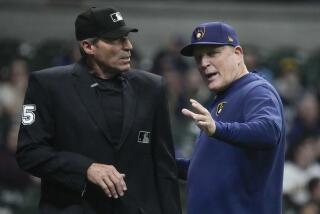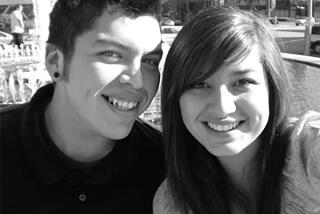Baseball agent goes to trial in Cuban smuggling case
- Share via
MIAMI — In a trial that may ultimately shine a spotlight on Major League Baseball’s Cuba policies, baseball agent Gustavo Dominguez today faces charges of smuggling Cuban players to the U.S., then harboring them for profit.
Dominguez, a former Cal State Northridge pitcher who lives in Chatsworth, was charged by a grand jury in October with conspiring to bring Cuban players into the U.S., then transporting them to California and providing them with housing and training in the hope of securing lucrative free-agent contracts.
Dominguez, vice president of the Encino agency Total Sports International, which claims to represent more than four dozen baseball players, faces more than 45 years in prison if convicted on all 53 counts.
An artist by training, Dominguez has been representing Cubans since 1991, when a friend asked him to help pitcher Rene Arocha, the first player to defect from the island since the Communist revolution. But in doing so, Dominguez -- and other agents -- have found themselves confronted by MLB’s sometimes Byzantine enforcement of its policies, which treat Cubans differently from any other foreign nationals by forcing them to establish residency outside their homeland before they can sign with a big-league team.
Among those called to testify against Dominguez in a Key West courtroom will be Lou Melendez, who, as MLB’s vice president of international baseball operations, has become the commissioner’s point man on Cuba.
The defense was dealt a substantial blow last month when Judge K. Michael Moore banned attorneys from citing U.S. immigration law, specifically the “wet foot/dry foot” policy, in its case. Wet foot/dry foot, a 1995 revision of the government’s Cuban Adjustment Act, allows Cubans to remain legally in the U.S. if they reach dry land before being discovered. Defense attorneys had hoped to argue that the immigrants their clients were charged to have helped were already on U.S. soil when their presence here was announced, therefore Dominguez and his co-defendants could not be prosecuted for smuggling them in.
But the judge ruled U.S. immigration law was not applicable and “would not provide a valid defense.”
Two of Dominguez’s original co-defendants -- Geoffrey Rodrigues and Ramon Batista -- already have reached plea agreements with the government and are expected to testify for the prosecution. Others expected to appear on the government’s behalf include Seattle Mariners shortstop Yuniesky Betancourt and Chicago Cubs catcher Henry Blanco, a Dominguez client who has been subpoenaed to testify.
More to Read
Go beyond the scoreboard
Get the latest on L.A.'s teams in the daily Sports Report newsletter.
You may occasionally receive promotional content from the Los Angeles Times.











